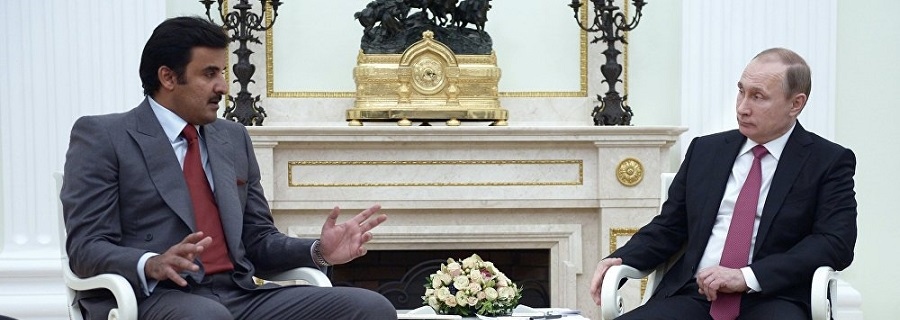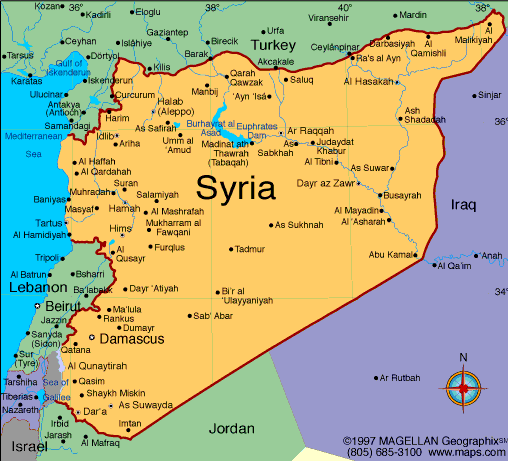Russia’s influence in Middle East
March 26, 2018 | Expert Insights

Qatar’s emir Sheikh Tamim bin Hamad Al Thani is in Moscow presently to discuss the Syrian civil war with Russian President Vladimir Putin. The two leaders are also expected to discuss other matters pertinent to the Middle East.
Background
Over the span of several centuries, Syria, which was at the forefront of the Islamic Caliphate has witnessed multiple invasions and occupations. The Romans, the Crusaders, and the Turks have tried to gain control of the region.
In 1946, the modern state of Syria was born when it got its independence from France. A country of fertile plains, high mountains and deserts, it is home to diverse ethnic and religious groups, including Kurds, Armenians, Assyrians, Christians, Druze, Alawite Shia and Arab Sunnis. The majority of the Muslim population in Syria is made up of Arab Sunnis.
The Syrian Civil War has been going on since 2011. It began during the Arab Spring protests and due to resentment towards the government of President Bashar al-Assad. The war is being fought by several factions: the Syrian government and its allies, a loose alliance of Sunni Arab rebel groups (including the Free Syrian Army), the majority-Kurdish Syrian Democratic Forces (SDF), Salafi jihadist groups (including al-Nusra Front) and the Islamic State of Iraq and the Levant (ISIL), with a number of countries in the region and beyond, being either directly involved, or rendering support to one or another faction.
Russian involvement in Syria
Russia has supported the internationally recognized government of Syria since the beginning of the Syrian conflict in 2011: politically, with military aid, and since 30 September 2015 also through direct military involvement. The latter marked the first time since the end of the Cold War that Russia entered an armed conflict outside the borders of the former Soviet Union. In October 2017, Russia vetoed a resolution to extend the UN's probe into chemical weapons attacks in Syria. It was the 10th time Moscow has used its veto powers at the UN in support of its ally since the conflict began.

Analysis
Qatar’s emir Sheikh Tamim bin Hamad Al Thani is scheduled to discuss pertinent issues regarding the Syrian civil war with Russian President Vladimir Putin. Al Thani is currently on a short official visit to Moscow and Syria will be the prime focus. The Qatari emir is also expected to discuss the civil war in Yemen and also the situation in Palestine.
Dmitry Frolovsky, a Moscow-based analyst said "There is going to be division of Syria and obviously the most powerful parties in Syria will be Russia and the United States. Qatar for various reasons will try to maintain stable contacts with both of the parties.”
Frolovsky also noted that this meeting once again signals Russia’s increased importance in Middle Eastern geopolitics. "It's not only the [Gulf] crisis that boosted the relations [with Gulf countries] but also the general Russian presence in the region which has been augmenting since Putin took part in the Syrian crisis," Frolovsky said.
Russia has played a crucial role in negotiating the latest rebel evacuation with rebel forces in Syria’s Eastern Ghouta. Two rebel factions in the region have already surrendered in a deal that would ensure their free passage from the region. Only the third major faction, Jaish al-Islam, has refused to give in to the government’s demands and surrendered. These negotiations have taken place between the Russian military and the rebel factions.
The heavy military offensive in Eastern Ghouta has resulted in the deaths of at least 1,500 people.
Assessment
Our assessment is that Russia’s importance in Middle Eastern geopolitics continues to grow. In the recent months, America may have lost some of its strategic influence in the region. Many leaders in the Middle East have signaled that they are willing to engage with President Putin in trying to resolve various crises in the Middle East and the Persian Gulf. Quite recently, the Palestinian Authorities have also indicated that they would like to have the Russians also moderating in the peace process.








Comments